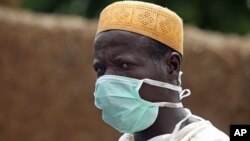Nigeria will release funds this week to tackle the world's worst lead poisoning outbreak which has killed at least 400 children, a senator said on Monday, ending months of official inaction in which 1,500 more children were put at risk.
In May last year the government pledged 850 million naira ($5.4 million) to help clean up the lead and treat the thousands poisoned by contamination from an artisan gold mine in the Bagega area of northern Zamfara, but medical charity Doctor's Without Borders (MSF) said the money never materialized.
MSF said none of the ministers - mines, environment and health - scheduled to attend a conference on the poisoning last year showed up, and after that repeatedly complained that funds pledged for a cleanup had not been disbursed.
"The funds will be released this week," Bukola Saraki, head of a senate environment committee told Reuters in an interview.
"Unfortunately not enough attention has been paid on this. Sometimes the most vulnerable get forgotten, “said Saraki, who visited the affected areas of Zamfara last week.
MSF have said they are running out of time to complete the remediation - clearing up of the lead - before the rainy season starts in April. Impassable roads will then make it too difficult for the cleanup team to start work until the rainy season ends around October.
Until they have cleared the lead they cannot effectively treat 1,500 children under the age of five who are contaminated.
The epidemic could still get worse because artisan mining continues unabated in Zamfara, where people say they can earn $4 a day, more than other available jobs.
"They're not going to stop. I saw a woman who had lost eight kids, but she is still mining," Saraki said.
"The only way around it is to invest in getting better methods for mining, provide modern equipment and get a more structured industry for these people to work in."
MSF has criticized the government for banning artisan mining, an approach it says will not work, instead of helping the poor community to make it safe.
Nigeria has one of the world's worst records on environmental protection, with massive oil spills in its southeastern Niger Delta region occurring frequently.
Government pledges to commit funds to clean up the devastation there and stop gas flaring have been largely unmet.
In May last year the government pledged 850 million naira ($5.4 million) to help clean up the lead and treat the thousands poisoned by contamination from an artisan gold mine in the Bagega area of northern Zamfara, but medical charity Doctor's Without Borders (MSF) said the money never materialized.
MSF said none of the ministers - mines, environment and health - scheduled to attend a conference on the poisoning last year showed up, and after that repeatedly complained that funds pledged for a cleanup had not been disbursed.
"The funds will be released this week," Bukola Saraki, head of a senate environment committee told Reuters in an interview.
"Unfortunately not enough attention has been paid on this. Sometimes the most vulnerable get forgotten, “said Saraki, who visited the affected areas of Zamfara last week.
MSF have said they are running out of time to complete the remediation - clearing up of the lead - before the rainy season starts in April. Impassable roads will then make it too difficult for the cleanup team to start work until the rainy season ends around October.
Until they have cleared the lead they cannot effectively treat 1,500 children under the age of five who are contaminated.
The epidemic could still get worse because artisan mining continues unabated in Zamfara, where people say they can earn $4 a day, more than other available jobs.
"They're not going to stop. I saw a woman who had lost eight kids, but she is still mining," Saraki said.
"The only way around it is to invest in getting better methods for mining, provide modern equipment and get a more structured industry for these people to work in."
MSF has criticized the government for banning artisan mining, an approach it says will not work, instead of helping the poor community to make it safe.
Nigeria has one of the world's worst records on environmental protection, with massive oil spills in its southeastern Niger Delta region occurring frequently.
Government pledges to commit funds to clean up the devastation there and stop gas flaring have been largely unmet.





